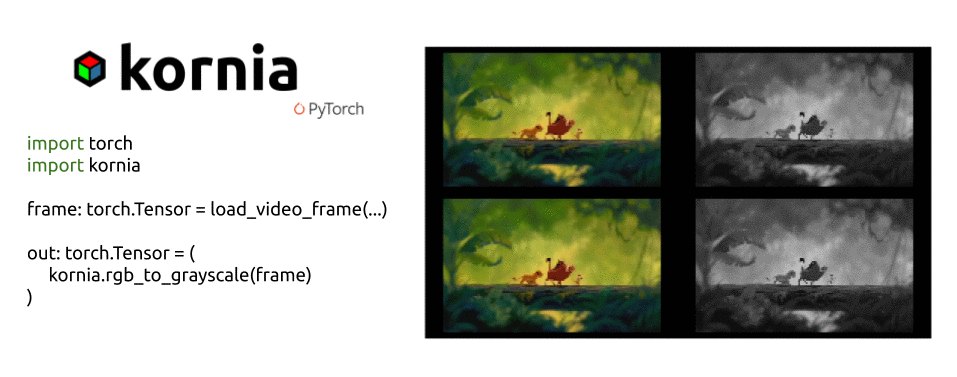kornia
Kornia is a differentiable computer vision library for PyTorch.
It consists of a set of routines and differentiable modules to solve generic computer vision problems. At its core, the package uses PyTorch as its main backend both for efficiency and to take advantage of the reverse-mode auto-differentiation to define and compute the gradient of complex functions.

Overview
Inspired by existing packages, this library is composed by a subset of packages containing operators that can be inserted within neural networks to train models to perform image transformations, epipolar geometry, depth estimation, and low-level image processing such as filtering and edge detection that operate directly on tensors.
At a granular level, Kornia is a library that consists of the following components:
| Component | Description |
|---|---|
| kornia | a Differentiable Computer Vision library, with strong GPU support |
| kornia.augmentation | a module to perform data augmentation in the GPU |
| kornia.color | a set of routines to perform color space conversions |
| kornia.contrib | a compilation of user contrib and experimental operators |
| kornia.enhance | a module to perform normalization and intensity transformation |
| kornia.feature | a module to perform feature detection |
| kornia.filters | a module to perform image filtering and edge detection |
| kornia.geometry | a geometric computer vision library to perform image transformations, 3D linear algebra and conversions using different camera models |
| kornia.losses | a stack of loss functions to solve different vision tasks |
| kornia.morphology | a module to perform morphological operations |
| kornia.utils | image to tensor utilities and metrics for vision problems |
Installation
From pip:
pip install kornia
Other installation options
From source:
python setup.py install
From source with symbolic links:
pip install -e .
From source using pip:
pip install git+https://github.com/kornia/kornia
Examples
Run our Jupyter notebooks tutorials to learn to use the library.
Cite
If you are using kornia in your research-related documents, it is recommended that you cite the paper. Se more in CITATION.
@inproceedings{eriba2019kornia,
author = {E. Riba, D. Mishkin, D. Ponsa, E. Rublee and G. Bradski},
title = {Kornia: an Open Source Differentiable Computer Vision Library for PyTorch},
booktitle = {Winter Conference on Applications of Computer Vision},
year = {2020},
url = {https://arxiv.org/pdf/1910.02190.pdf}
}







